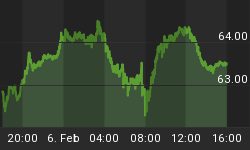With the Yen collapsing vs. all other currencies, inquiring minds may be wondering how prime minister Shinzo Abe's inflation policy is working out in practice. Let's start with a look at the Yen.
Yen Daily Chart for One Year

In the last year, the Yen has fallen from 124.79 to 97.56. That is a decline of 21.82%. Recall that Abe's policy is an attempt to raise inflation and spur exports.
Japan Still in Deflation
On May 19, Reuters reported Japan's Amari: core core CPI showing signs of turning positive due to BOJ.
Japanese Economics Minister Akira Amari said on Monday that core-core consumer prices, which exclude fresh food and energy, are showing signs of turning positive due to the Bank of Japan's aggressive monetary easing. Amari, speaking to reporters, also said the government still judges Japan to be in mild deflation as other measures of consumer prices are still falling when compared to the same period a year ago.
Fancy that. Consumer prices are still falling in spite of a 21% plunge in the currency. OK, but what about exports and imports?
Good question. I'm Glad you asked.
Japan Exports Disappoint
Please consider Japan Exports Disappoint, Full Benefits of Weak Yen Yet to Show
Japan's exports rose less than expected in April from a year earlier due to weak demand from Europe and China, highlighting the challenges confronting the world's third-biggest economy as policymakers try to engineer a sustained revival.
The 3.8 percent annual increase in exports in April was below the median estimate for a 5.9 percent rise and followed a 1.1 percent increase in the year to March.
The result also underscores the limitations of a weak yen in bolstering the trade sector, especially as external headwinds crimp demand for exports.
The uncertainty was underlined recently by a string of weak data from the United States and China, Japan's major export markets.
Imports jumped 9.4 percent year-on-year in April, up for a sixth straight month, due to an increase in liquefied natural gas purchases, compared with a 6.7 percent gain expected by economists.
That has brought the country's trade balance into a deficit of 879.9 billion yen, the biggest trade gap for the month of April under comparable data series going back to 1979, according to the finance ministry.
It compared with the economists' forecast for 621.1 billion yen deficit, leaving the trade balance in the red for ten months in a row, the longest such run since 1979-1980 when Japan was hit by surging oil prices.
Abenomics Synopsis
- Year-over-year the is Yen down 21.82% vs. the US Dollar
- Japanese consumer prices are still falling
- Imports jumped 9.4%, up for a sixth straight month
- Exports up 3.8%
- Trade balance negative for 10 straight months
- Largest April trade deficit since 1979
People think Shinzo Abe is a hero because the Nikkei is up.
I think Abe is an absolute economic nutcase who is going to create a currency crisis in Japan if he succeeds in changing the constitution like he desires (and quite possibly even if he doesn't).
For further discussion, please see Will Shinzo Abe Succeed with Constitutional Changes to Militarize Japan and Further Destroy the Yen?















